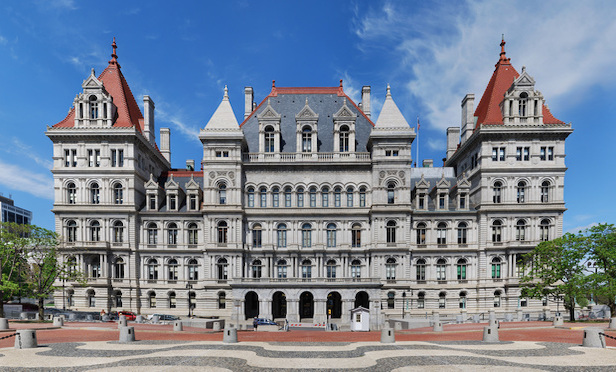 New York State Capitol in Albany/ Photo credit: Photo: Matt H. Wade via Wikipedia
New York State Capitol in Albany/ Photo credit: Photo: Matt H. Wade via Wikipedia
NEW YORK CITY—Legislators came to an agreement on rent regulation and tenant protection. The rent regulations were to expire on Saturday, lawmakers passed the reforms and Governor Andrew M. Cuomo signed them into law on Friday.
Senate majority leader Andrea Stewart-Cousins and assembly speaker Carl Heastie said in a joint statement, “These reforms give New Yorkers the strongest tenant protections in history. For too long, power has been tilted in favor of landlords and these measures finally restore equity and extend protections to tenants across the state.”
Others representing the real estate industry, such as Blaine Schwadel, a member of the law firm Rosenberg & Estis, say the changes will result in buildings not being properly maintained, loss of construction jobs, and harm to the real estate market.
Robert Gilman, co-leader of accounting firm Anchin, Block & Anchin's real estate group, says the new rent regulations represent a dramatic and negative change for owners of rent stabilized properties. “Landlords will basically see only minimal annual increases to revenue while dealing with increasing costs, especially real estate taxes. Drastically reducing the rent increases for Major Capital Improvements (MCI's) will give landlords little benefit from doing such projects. You will see a reduction in work being done on these properties,” says Gilman. “While tenants might think they are the big winners, let's see how they feel over time when little work is done to improve the buildings they live in.”
Highlights of the legislation include the following changes.
(1) Extends the rent regulation laws and makes them permanent: Previously rent regulation laws expired every four to eight years. Under the new system, they will require the legislature pass an act to repeal or terminate them.
(2) Repeals high rent vacancy deregulation and high-income deregulation: When rent reaches $2,774.76 and an apartment becomes vacant or when a tenant's income is at $200,000 for the preceding two years, landlords had been able to remove the apartment from rent regulation. This is no longer the law.
(3) Limits “owner use” exception to rent regulation to a single unit: To allow deregulation the law would require the owner or his/her immediate family use the unit as their primary residence.
(4) Keeps stabilized apartments rented by nonprofits under rent stabilization protection.
(5) Repeals the vacancy bonus and longevity bonus: Landlords will no longer be able to raise rents as much as 20% when a stabilized apartment becomes vacant. Rent can no longer be raised by additional amounts based on the duration of the previous tenant.
(6) Prohibits owners who have offered tenants a preferential rent below the legal regulated rent from raising the rent to the full legal rent upon renewal. Once the tenant vacates, the owner can charge any rent up to the full legal regulated rent, as long as the owner's failure to maintain the apartment in a habitable condition was not the cause of the tenant's departure.
(7) Sets maximum collectible rent increases for rent-controlled tenants with the average of the five most recent Rent Guidelines Board annual rent increases for one-year renewals. This law will also prohibit fuel pass-along charges.
(8) Extends the period for which an owner can be liable for rent overcharge claims from two to six years. Plus, under the new law, landowners can no longer avoid treble damages by voluntarily returning the amount of the rent overcharge prior to a decision made by a court or Housing and Community Renewal.
(9) Reforms rent increases for Major Capital Improvements (MCIs): The rent increase cap was lowered from 6% to 2% in New York City and from 15% to 2% in other counties. It eliminates MCI increases after 30 years instead of allowing them to remain in effect permanently. The new law also tightens the rules governing what spending qualifies for MCI increases and tightens enforcement of those rules by requiring 25% of MCIs be inspected and audited.
(10) Reforms rent increases for Individual Apartment Improvements (IAIs): The new law caps IAI spending at $15,000 over a 15-year period. It also requires owners to clear any hazardous violations in the apartment before collecting an increase.
(11) Reforms co-op/condo conversions: The agreed upon legislation strengthens protections for tenants in buildings that owners seek to convert into co-ops or condos. It requires 51% of tenants to agree to purchase apartments before a conversion could be effective. (Laws prior to the changes required that 15% of apartments must be sold and the purchasers may be outside investors.)
(12) Makes rent stabilization an option for localities statewide: With the new reforms not just New York City and its suburbs but any municipality across the state where there is less than 5% vacancy in housing stock can adopt a rent stabilization regime.
(13) Establishes stronger housing security and tenant protections across the state.
(14) Provides mobile and manufactured homes tenant protections.
This article was updated on Friday, June 14, 2019 at 6:45 pm.
© Touchpoint Markets, All Rights Reserved. Request academic re-use from www.copyright.com. All other uses, submit a request to [email protected]. For more inforrmation visit Asset & Logo Licensing.







